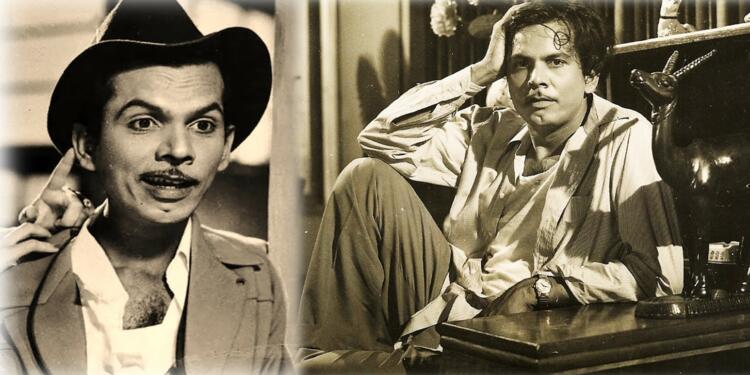Sometimes in the haste of the moment people go overboard in praising or criticising someone. Partaking in endless debates like ‘Greatest of all times’ (GOAT) or ‘King/Champion’ of a certain trait, people often anoint their favourites as GOAT or King irrespective of the merit of past and upcoming players of that trait.
But on critical and unbiased analysis, things start to unravel themselves as they are. Several movie buffs have dubbed Johnny Walker as “Comedy King”. Through this article we will highlight that these arguments and claims are nothing but shallow to their core.
The bumpy ride to Bollywood
Badruddin Jamaluddin Kazi, popularly known as Johnny Walker, was born on 15th of May, 1923 in Indore. His father worked in a textile mill and had to look after a family of fifteen members. Young Kazi faced several hardships as five of his relatives died young and the mill where his father worked closed down suddenly. For economic considerations, the family migrated to Bombay where Kazi tried his luck in several jobs.
Later, he secured a post in B.E.S.T (Bombay Electric Supply and Transport) bus service. Working as a bus conductor, Kazi often amused and entertained passengers with his antics and uncanny tricks to play random acts.
Later, the year of 1951 proved to be a major turning point in his life. He was spotted by Bollywood actor and writer Balraj Sahni when he was doing his regular antics in the bus. At that time, Balraj Sahni was working on the film ‘Baazi’ with Guru Dutt. Highly impressed by Kazi’s theatrics, Sahni introduced him to Guru Dutt.
This incident not only changed Kazi’s life forever, it also earned him the colloquial name Johnny Walker. Guru Dutt was spell-bound after seeing Kazi essay the role of drunkard and consequently named him Johnny Walker after the well-known whiskey Johnny Walker. The rationale behind it was that Kazi pulled an “excellent performance” of a drunkard even without consuming alcohol. It was from there on that the stage name Johnny Walker came into being and he made his cinematic debut.
Cinematic journey
After that fateful encounter, Guru Dutt immediately wrote a role for Johnny Walker in his directorial film Baazi (1951). Johnny Walker’s performance in the film was well received. Thereafter, Guru Dutt cast Johnny Walker in several of his movies.
Throughout his career, Johnny Walker acted in around 300 films. Many cinephiles hail him as “Comedy King” and credit him for laying the foundation of the ‘comedy genre’. These claims are nothing but hyperbole. Contrary to these tall claims, Walker had the famed comic lines mostly in Guru Dutt’s films and had limited success outside this clear pattern.
For example, some of Walker’s most loved roles are Master in C.I.D. (1956) and Abdul Sattar in Pyaasa (1957) were Guru Dutt movies. In the film C.I.D, he performed a satirist act in the popular song, “Aye Dil Hai Mushkil Jeena Yahan Yeh Hai Bombay Meri Jaan”. For this role, Walker received wide admirations for highlighting the dark side of major cities.
His films with other directors hardly received a fraction of the success that he received after performing in Guru Dutt’s movies. With other directors, his role either had a very short run or his roles did not get any priority.
He received his first Filmfare Award for his role in Bimal Roy directed film Madhumati. But barring a few exceptions, Johnny Walker failed to attract eye-balls while performing under the direction of other Bollywood directors.
Additionally, Johnny Walker failed to break the stereotype of a drunkard and prove his versatility as other comedians like Kanwarjit Paintal, Govardhan Asrani, Mehmood and Kishore Kumar.
Furthermore, Walker’s popularity and cinematic career came to a grinding halt post Guru Dutt’s demise. In the 1960s, Mehmood completely side-lined him. In the later phase, Walker only gave a few notable roles. He won his second and final Filmfare Award in 1968 for playing the role of Teju in Shikar. He was last seen as a make-up artist in Kamal Haasan’s Chachi 420 (1997).
Read More: Khemchand Prakash – The maestro who introduced us to legends like Lata Mangeshkar and Kishore Kumar
Guru Dutt was one of the strong pillars for the success of Johnny Walker as a comedian. Evidently, Guru Dutt used to purposely write characters and dialogues for Johnny Walker to make him a part of his films.
In an interview, Johnny Walker highlighted the chemistry which he enjoyed with Guru Dutt.
Johnny said, “He used to tell me – Here’s your scene, your dialogue. If you can do better, go ahead. In every rehearsal I would come up with something new. Guru Dutt used to love that. He used to look at everyone on the sets and see if the light boys, the cameraman, the assistants were laughing at my dialogues. Guru Dutt then had an assistant to write down whatever I said in the rehearsals. That’s how we worked.”
On critical analysis it is clear that Johnny Walker fared well only in movies that were the director’s baby. His comic skills failed miserably to amaze the audiences or make them laugh whenever he didn’t have the director’s crutches. On these accounts, the claims of him being ‘Comedy King’ does not hold water. He was at best a director’s or more precisely Guru Dutt’s character actor and comedian.
Support TFI:
Support us to strengthen the ‘Right’ ideology of cultural nationalism by purchasing the best quality garments from TFI-STORE.COM




























